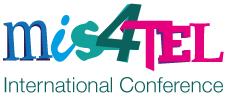Contact us: info@mis4tel-conference.net
Information
Scope
The workshop follows the previous SPeL 2008, SPeL 2009, SPeL 2010, SPeL 2011, DULP & SPeL 2012, SPeL 2013, SPeL 2014, SPeL 2015, SPeL 2016 and SPeL 2017 workshops, held in conjunction with the SAINT 2008 conference, WI/IAT 2009 conference, DEXA 2010 conference, ICWL 2011 conference, ICALT 2012 conference, ICSTCC 2013 conference, ICWL 2014 conference, ICSLE 2015 conference, ICWL & SETE 2016 conferences and ICWL & SETE 2017 conferences respectively. The general topic of the workshop is the social and personal computing for web-supported learning communities.
Web-based learning is moving from centralized, institution-based systems to a decentralized and informal creation and sharing of knowledge. Social software (e.g., blogs, wikis, social bookmarking systems, media sharing services) is increasingly being used for e-learning purposes, helping to create novel learning experiences and knowledge. In the world of pervasive Internet, learners are also evolving: the so-called "digital natives" want to be in constant communication with their peers, they expect an individualized instruction and a personalized learning environment, which automatically adapt to their individual needs. The challenge in this context is to provide intelligent and adaptive support for collaborative learning, taking into consideration the individual differences between learners.
This workshop deals with current research on the interplay between collaboration and personalization issues for supporting intelligent learning environments. Its aim is to provide a forum for discussing new trends and initiatives in this area, including research about the planning, development, application, and evaluation of intelligent learning environments, where people can learn together in a personalized way through social interaction with other learners.
The workshop is targeted at academic researchers, developers, educationists and practitioners interested in innovative uses of social media and adaptation techniques for the advancement of intelligent learning environments. The proposed field is interdisciplinary and very dynamic, taking into account the recent advent of Web 2.0 and ubiquitous personalization, and it is hoped to attract a large audience.
Topics
The workshop welcomes submissions covering aspects of collaboration, social interactions, adaptivity and personalization in technology enhanced learning, particularly related to issues about:
- Social learning environments
- Theory and modeling of social computing in education
- Web 2.0 tools for collaborative learning
- Personal learning environments
- Lifelong learning networks
- Virtual spaces for learning communities
- Social networks analysis and mining
- Computer-supported collaborative learning
- Personalized and adaptive learning
- Adaptation methods and techniques for groups of learners
- Intelligent learner and group modeling
- Collaborative filtering and recommendations for learners
- Game-based social learning
- Personalized mobile learning applications
- Cloud-based social learning
- Intelligent agent technology for social learning
- Metadata, folksonomies and tagging
- Semantic web and ontologies for personalized learning
- Cognitive, motivational and affective aspects for personalization
- Practice and experience sharing
Committee
Organizing Committee
- Elvira Popescu - University of Craiova (Romania)
- Sabine Graf - Athabasca University (Canada)
Program Committee
TBC
Contact
Dr. Elvira Popescu at popescu_elvira@software.ucv.ro
Dr. Sabine Graf at sabineg@athabascau.ca
